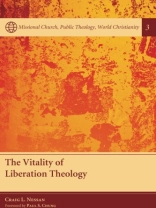The Vitality of Liberation Theology argues for the ongoing necessity of a liberating theology in a world of endemic poverty and economic globalization. Although some have declared liberation theology’s demise, or even its death, Nessan articulates the imperative and logic of it for a new generation. Latin American liberation theology burst forth as the most original and compelling theological movement from the developing world in the modern period. The story of the emergence and proliferation of liberation theology, as well as the opposition to this movement both within and without Latin America, is one of the most significant and lasting developments in Christianity since the last third of the twentieth century. Together with other forms of liberating theology from contexts of oppression in diverse parts of the world (anti-apartheid theology in South Africa and Namibia, Minjung theology in Korea, Dalit theology in India, or Palestinian liberation theology), Latin American liberation theology takes a prophetic stand against the hegemony of the status quo and joins league with other subaltern peoples in the cause of freedom from all forms of subjugation and oppression. The dawn of Latin American liberation theology inaugurated a new era in the global theological landscape.
Об авторе
Paul S. Chung is Associate Professor of Mission and World Christianity at Luther Seminary, St. Paul, Minnesota. He is the author of numerous books including Reclaiming Mission as Constructive Theology (2012) and Church and Ethical Responsibility in the Midst of World Economy (2013).







![Обложка Brian Schrag & Julisa Rowe: Community Arts for God's Purposes [Chinese] 貼近神心意的社群藝術 Обложка Brian Schrag & Julisa Rowe: Community Arts for God's Purposes [Chinese] 貼近神心意的社群藝術](https://static.worldofdigitals.com/thumb_webp/740/9781645083740.webp)




